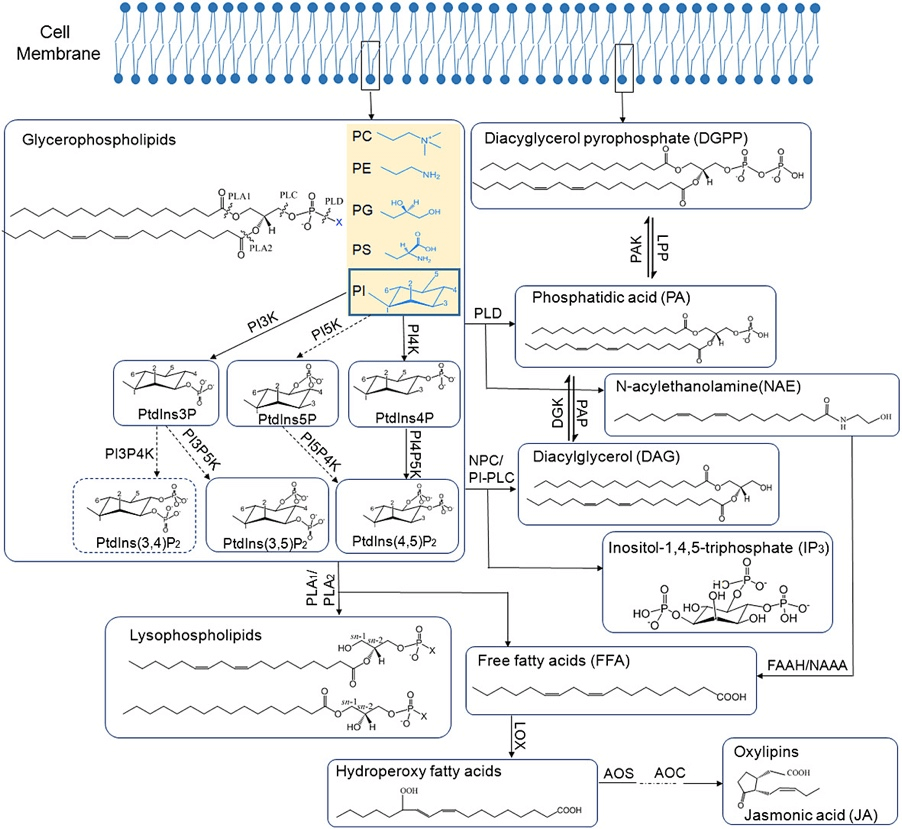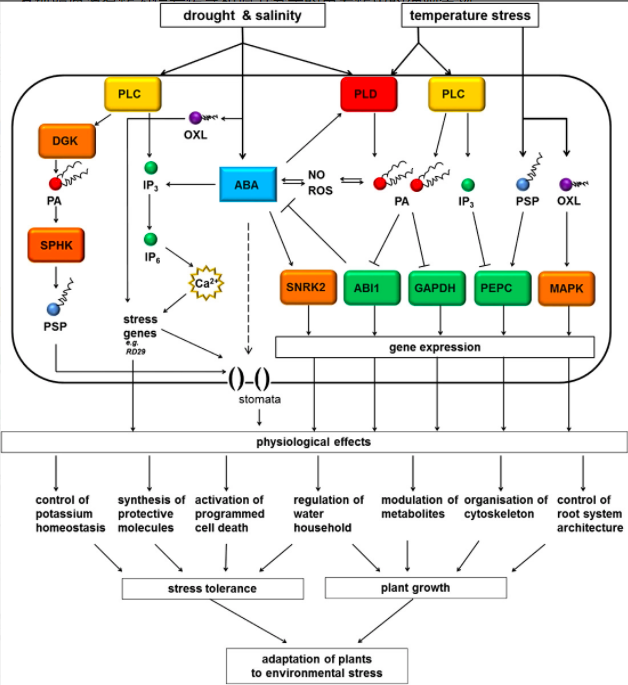Lipidomics in Plant Abiotic Stress Research
As sessile organisms, plants face a variety of abiotic stresses. Abiotic stresses such as high salt, low temperature, drought and heavy metal pollution have serious adverse effects on the growth, development and seed setting of plants, especially crops. To survive in these environments, plants must recognize environmental stress and quickly deploy multiple defense responses. At the same time, they must reduce the cellular damage caused by stress.
Lipids are major and important cellular components that provide the structural basis for cell membranes and provide energy reserves for metabolism. Lipids are involved not only as signaling mediators in the initiation of defense responses, but also in the mitigation process of plant cells in response to stress.
Plants sense these stimuli and transduce the signal into downstream biological responses often through the plasma membrane, which is generally the source for signalling lipids. The list of signalling lipids includes phosphatidic acid (PA), phosphoinositides (PIs), sphingolipids, lysophospholipids, oxylipins, free fatty acids (FFAs) and others.
 Fig1. The relationship of different signalling phospholipids and their pathways in plants (Hou, Quancan.; et al, 2016)
Fig1. The relationship of different signalling phospholipids and their pathways in plants (Hou, Quancan.; et al, 2016)
Lipids also play essential roles other than as signal mediators. For instance, the well defined relationship between membrane composition and chilling sensitivity has been verified by genetic modification that changed the saturation rate of a particular lipid class. Recently, a detailed analysis of changes in glycerolipid metabolism in response to temperature change was also reported.
 Fig2. Overview of lipid-mediated stress-activated pathways in plants (Hou, Quancan.; et al, 2016)
Fig2. Overview of lipid-mediated stress-activated pathways in plants (Hou, Quancan.; et al, 2016)
Analyzing lipid changes in plants under abiotic stresses through lipidomics and speculating on plant response to adversity environment by regulating metabolic pathways will provide a favorable approach to study the mechanisms of plant tolerance and adaptation. Creative Proteomics provides reliable, rapid, and cost-effective plant lipidomics and targeted lipidomics services based on GC-MS and LC-MS platforms.
Strategies for Lipidomic Analysis of Plant Abiotic Stress Research
Creative Proteomics designs experimental programs according to customer needs and chooses different technical methods to improve detection efficiency and ensure the accuracy and repeatability of experimental results.
Based on LC-MS/MS technology to simultaneously analyze hundreds of different lipids in biological samples to obtain more information. Through bioinformatics data analysis, we can systematically elucidate the variation at the lipidome level and the regulatory mechanisms in the experimental group compared to the control group from a lipid perspective.
Targeting specific lipid molecules and their metabolites in samples. Based on high-resolution mass spectrometry and isotope internal standard, we use parallel reaction monitoring (PRM) targeted analysis technology, which can realize the specific acquisition of signals of multiple lipid molecules (such as dozens of target lipid molecules) at the same time, and obtain their absolute contents to meet the needs of targeted detection and verification of target lipids. Using Orbitrap mass analyzer and ultra-high resolution mass spectrometry, high quality data can be obtained. Sensitivity up to ppm level and linearity range up to 5-6 orders of magnitude.
Advantages
- One-stop service from preparing samples, running mass spectrometry, processing data, performing statistical analysis, and identifying compounds.
- Choose the right mass spectrometry method for your experimental design.
- Compatible with many types of samples, from various plant organs and plant seeds to plant sub-cells.
How we work in 7 easy steps

If you have any questions about our lipidomics services in plant abiotic stress research, please contact us. With our highly experienced scientific team, advanced techniques and equipment, we can tailor our services according to your needs.
Reference:
- Hou, Quancan.; et al. Lipid signalling in plant responses to abiotic stress. Plant, cell & environment. 2016, 39.5: 1029-1048.
* Our services can only be used for research purposes and Not for clinical use.


 Fig1. The relationship of different signalling phospholipids and their pathways in plants (Hou, Quancan.; et al, 2016)
Fig1. The relationship of different signalling phospholipids and their pathways in plants (Hou, Quancan.; et al, 2016) Fig2. Overview of lipid-mediated stress-activated pathways in plants (Hou, Quancan.; et al, 2016)
Fig2. Overview of lipid-mediated stress-activated pathways in plants (Hou, Quancan.; et al, 2016)